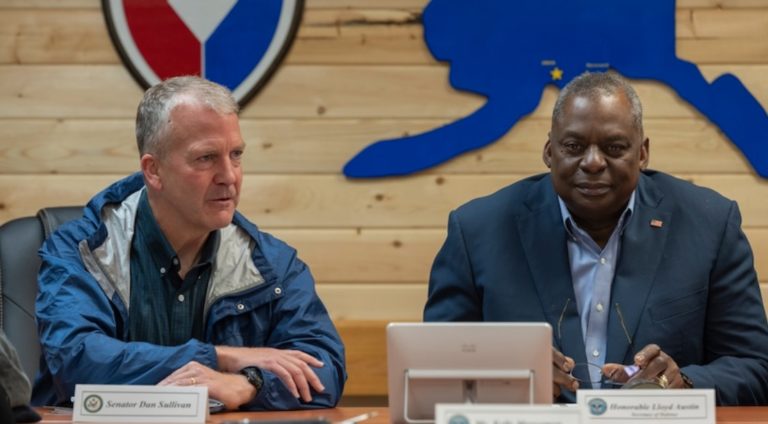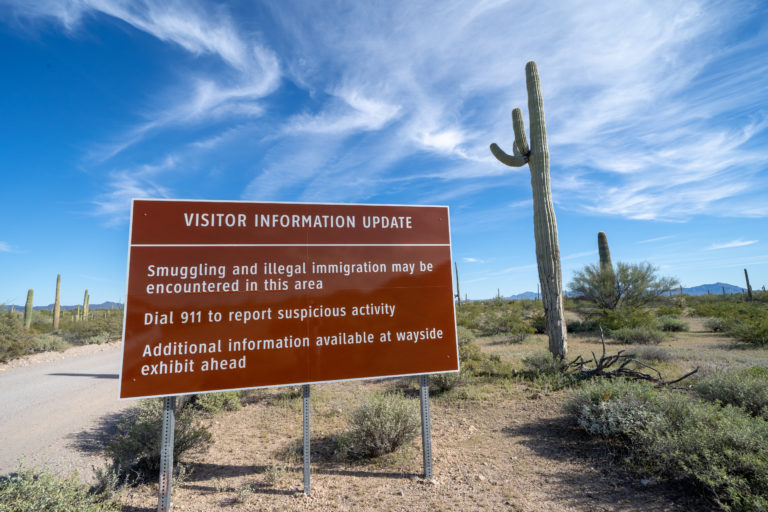By BETHANY BLANKLEY | THE CENTER SQUARE
A coalition of 26 state attorneys general, including Alaska’s Treg Taylor, is calling on the new U.S. Speaker of the House to pass a Florida-sponsored bill that would grant states the authority to enforce federal immigration law when the federal government refuses to do so.
The AGs, led by Florida Attorney General Ashley Moody, sent a letter to Speaker Mike Johnson, R-Louisiana, on Monday. In it, they called on Congress to pass U.S. Rep. Bill Posey’s bill, the Immigration Enforcement Partnership Act. Posey, R-Florida, first filed the measure in 2022 and again in March 2023.
“On day one, [President Joe] Biden began intentionally dismantling our public safety immigration structure,” Moody said. The president and U.S. Department of Homeland Security Secretary Alejandro Mayorkas “have outright ignored federal law, and we have uncovered numerous ‘secret plans’ to allow for the mass release of unvetted and inadmissible migrants,” she said, referring to Florida’s border-related lawsuits against the administration.
The administration’s parole and mass release policies are “not only in direct conflict with federal law, but it has also put Americans’ safety in jeopardy,” Moody said. Despite Florida’s repeated wins in court, Moody said, “more needs to be done. I like to believe we at least slowed the invasion to some degree. However, it is becoming clear that the judicial system is not an adequate battlefield to quickly address the urgent crisis Biden has created.”
Posey on Monday called for Mayorkas to be impeached. In posts on social media, he said, “The border crisis is at unmanageable levels of mass migration. Simply put, Sec. Mayorkas isn’t doing his job. In the real world, if someone fails to do their job, they are fired. Sec Mayorkas has failed at the southern border. I support the initiative to impeach Mayorkas.”
Posey’s bill, HR 1337, would allow state officials to require the DHS secretary to enforce federal immigration law in certain circumstances. It gives DHS the option to enforce the law or deputize state officials to carry out federal immigration duties instead.
According to the bill, state attorneys general would identify how DHS isn’t fulfilling its non-discretionary duties under Title II of the Immigration and Nationality Act, which includes arresting, detaining and removing criminal and arriving illegal immigrants. It also requires the courts to expedite proceedings related to these actions to the greatest extent practicable, according to a summary of the bill.
If enacted, the measure “authorizes a state attorney general to request in writing that the Department of Homeland Security adequately fulfill certain duties related to immigration enforcement. Within 30 days of receiving such a request, DHS must ensure that such duties are adequately fulfilled by DHS officers and employees or authorize that state’s officials to fulfill such duties. The state attorney general may sue DHS for failure to meet this bill’s requirements,” according to the bill language.
“Maintaining operational control over our borders is critical to our security and our ability to stop drug smugglers, human traffickers, and those on terrorist watch lists, who are invading our country and mean to do harm to our communities,” Posey said when he introduced the bill earlier this year. “When the federal government abdicates its role in securing our nation’s borders and refuses to enforce immigration laws, states should have authority to protect their citizens.”
The AG’s argue in their letter, “Had Congress acted sooner, the U.S. might not be setting yet another record for CBP encounters at the border. We will never know, but if we take action now to give states the authority to do the job Biden and Mayorkas refuse to do, we could prevent another record next year.”
The letter points out that in September alone, enough fentanyl was seized in the Rio Grande area of the Mexico-U.S. border to kill 25 million Americans, or the entire populations of Washington, Oregon, Montana, Idaho, Montana, Nevada, Utah, New Mexico, Wyoming, and South Dakota combined.
They urged Johnson “to at the very least, expeditiously give” Posey’s bill a hearing.
Joining Moody in the coalition are the attorneys general representing the states of Alabama, Alaska, Arkansas, Georgia, Idaho, Indiana, Iowa, Kansas, Kentucky, Louisiana, Mississippi, Missouri, Montana, New Hampshire, North Dakota, Ohio, Oklahoma, South Carolina, South Dakota, Tennessee, Texas, Utah, Virginia, West Virginia and Wyoming.
The Texas Senate for the third time last month passed a bill that authorizes the state to enforce border security. It would create a new state crime for entering Texas illegally and authorize Texas law enforcement officers to arrest illegal border crossers who enter Texas between ports of entry. The measure has gone nowhere in the state House.
The coalition letter misstates border apprehension data, appearing to confuse southwest border apprehension data with national apprehension data, and underreports the number of known, suspected terrorists who’ve illegally entered the U.S. and been caught.
It states, “record-breaking numbers of inadmissible immigrants flooding in – more than 7 million illegal immigrants have walked freely into the country since Biden took office – including more than 280 individuals encountered on the terrorist watchlist since fiscal year 2021.”
According to official U.S. Customs and Border Protection data and preliminary gotaway data obtained by The Center Square, the numbers are significantly higher.
There were 736 known, suspected terrorists apprehended in fiscal 2023 alone, the highest in recorded history. The majority, 66%, were apprehended at the northern border, The Center Square first reported.
There were nearly 4 million illegal border crossers reported nationwide in fiscal 2023, and over 10 million illegal border crossers reported since January 2021, including gotaways, The Center Square first reported.
There have been roughly 1.7 million gotaways reported since January 2021, although this number is estimated to be closer to 2 million, The Center Square first reported.









